Neurostar TMS Therapy in Connecticut
Does it Work?
Over 5.3 million NeuroStar Advanced TMS treatments have been performed in over 147,400 patients, with an 83% response rate.
Does it Hurt?
During the first week of NeuroStar treatment, mild to moderate scalp discomfort near the treatment area may happen. It is temporary and should decrease during later treatments. Unlike ECT, TMS has no negative effects on memory and requires just office visits and no anesthesia.
Is it Covered by Insurance?
NeuroStar TMS Therapy for depression is covered by most insurance plans, including Medicare and Tricare.
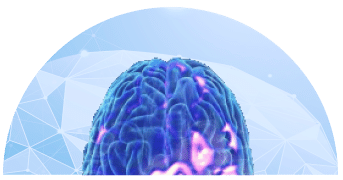
Take the First Step Towards Brighter Days
Reclaim Your Life with NeuroStar TMS Therapy
Take a brief survey to see if TMS is right for youWhat Is TMS?
Transcranial magnetic stimulation, often referred to as TMS, is a noninvasive procedure that uses magnetic fields to stimulate nerve cells in the brain to improve symptoms of depression. TMS is typically used when antidepressant medications haven’t been effective, have ceased working, or as an alternative to medication.
Learn More: TMS Safety & Efficacy
Why NeuroStar TMS Therapy?Learn More: TMS Safety & Efficacy
Why TMS?
In every branch of medicine, there is always an array of third-party vendors who manufacture medications, services, and medical equipment. Sterling Institute professionals are trained to pay close attention to the fact that among these vendors, quality varies widely.
Our medical experts have been recommending and providing TMS treatment since 2015 with direct experience. There are about five companies worldwide that manufacture TMS equipment of high enough quality to be considered and who provide TMS support services, some extensive, some minimal.
Before settling on Neurostar as a medical partner and supplier, our team engaged in a long and exhaustive search to determine which company provided the highest quality product and service. Ultimately, we decided on Neurostar—even though, from a financial perspective, its cost to our practice is by far the highest. (Reimbursement to us is essentially identical regardless of which vendor is used).
When you decide on TMS treatment at Sterling, you can be assured that your doctors have chosen what they consider the best possible option--Neurostar--is just that. Just as we encourage patients to question the results that often differ from brand versus generic-to-generic medications from different manufacturers, we encourage you to inquire about our choice of Neurostar. And we also encourage you to provide us with feedback, positive or negative, about your experience.
Our medical experts have been recommending and providing TMS treatment since 2015 with direct experience. There are about five companies worldwide that manufacture TMS equipment of high enough quality to be considered and who provide TMS support services, some extensive, some minimal.
Before settling on Neurostar as a medical partner and supplier, our team engaged in a long and exhaustive search to determine which company provided the highest quality product and service. Ultimately, we decided on Neurostar—even though, from a financial perspective, its cost to our practice is by far the highest. (Reimbursement to us is essentially identical regardless of which vendor is used).
When you decide on TMS treatment at Sterling, you can be assured that your doctors have chosen what they consider the best possible option--Neurostar--is just that. Just as we encourage patients to question the results that often differ from brand versus generic-to-generic medications from different manufacturers, we encourage you to inquire about our choice of Neurostar. And we also encourage you to provide us with feedback, positive or negative, about your experience.
A Drug Free Depression Treatment that Works for You
NeuroStar helps life become manageable again.
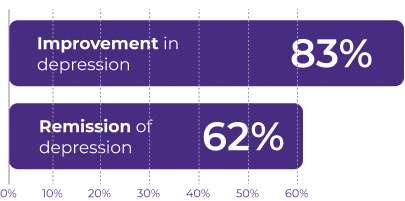
Over 5.3 million NeuroStar Advanced TMS treatments have been performed for 147,400 patients with an 83% response rate and a 62% remission rate. This beats the STAR*D study, which showed decreased remission rates with every subsequent medication.
Read More (NeuroStar Brochure)NeuroStar TMS is an Advanced Way to treat Depression

Why Us?
Sterling Institute is Fairfield County's premier behavioral health practice, offering both standard and cutting-edge treatments for the full range of mental health conditions., across the lifespan.
We have chosen as our TMS partner Neurostar, the country's highest quality manufacturer and vendor of Transcranial Magnetic Stimulation.
Our TMS service is not standalone but rather fully integrated into our comprehensive suite of professional care, covering all major conditions and accepting the broadest possible range of insurance plans.
Our physicians and the most highly qualified technicians nationwide care for every TMS patient. If you are under the care of a psychiatrist, we will collaborate with your professional for adjunct TMS treatment.
Our beautiful offices on the shores of Lake Kenosia provide the perfect, private environment for personalized treatment. If you are unable to come for treatment at Sterling, we will help you find a suitable center closer to your home.
Learn More: Why Neurostar TMS at Sterling Institute?
We have chosen as our TMS partner Neurostar, the country's highest quality manufacturer and vendor of Transcranial Magnetic Stimulation.
Our TMS service is not standalone but rather fully integrated into our comprehensive suite of professional care, covering all major conditions and accepting the broadest possible range of insurance plans.
Our physicians and the most highly qualified technicians nationwide care for every TMS patient. If you are under the care of a psychiatrist, we will collaborate with your professional for adjunct TMS treatment.
Our beautiful offices on the shores of Lake Kenosia provide the perfect, private environment for personalized treatment. If you are unable to come for treatment at Sterling, we will help you find a suitable center closer to your home.
Learn More: Why Neurostar TMS at Sterling Institute?
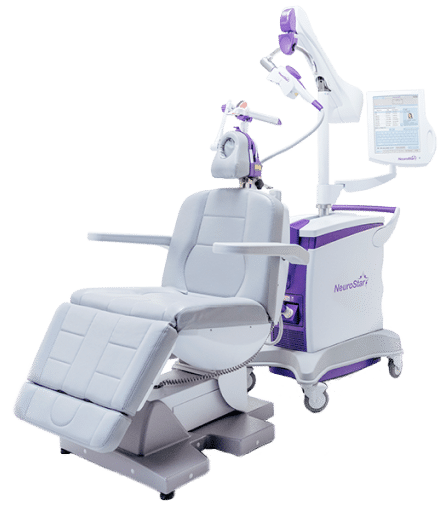
Non-Invasive
The NeuroStar Advanced Therapy TMS device is entirely external and its application is non-surgical. No anesthesia is required.
Read MoreResume Your Daily Activities with Ease
After your session, you can confidently return to regularly scheduled activities, such as work or school.
Read MoreCovered By Insurance
Most insurance companies will help cover the cost of your NeuroStar Advanced Therapy TMS consultation. Please find out more by contacting us today.
Read More
Non Invasive Procedure
Relief without the side effects of antidepressant medications
NeuroStar is not a drug, “shock” therapy, or surgery. And it doesn’t have any of the side effects associated with traditional antidepressants.
There is no sedation, anesthesia, or recovery time, and the NeuroStar treatment is relaxing for most people. The most common side effect is mild to moderate pain or discomfort at the treatment site that usually subsides within the first week of treatment.
NeuroStar TMS doesn’t go through the digestive system or affect the rest of the body, so it has none of the systemic side effects of antidepressant drugs. NeuroStar’s unique coil focuses treatment precisely at the source of the depression: the brain. Our patented Contact Sensing technology ensures the prescribed dosage, every treatment, and every pulse. This allows NeuroStar to treat depression safely without the side effects of medication.
NeuroStar is not a drug, “shock” therapy, or surgery. And it doesn’t have any of the side effects associated with traditional antidepressants.
There is no sedation, anesthesia, or recovery time, and the NeuroStar treatment is relaxing for most people. The most common side effect is mild to moderate pain or discomfort at the treatment site that usually subsides within the first week of treatment.
NeuroStar TMS doesn’t go through the digestive system or affect the rest of the body, so it has none of the systemic side effects of antidepressant drugs. NeuroStar’s unique coil focuses treatment precisely at the source of the depression: the brain. Our patented Contact Sensing technology ensures the prescribed dosage, every treatment, and every pulse. This allows NeuroStar to treat depression safely without the side effects of medication.
Covered By Insurance
NeuroStar is covered by most major insurance companies.
NeuroStar is the #1 physician-recommended TMS Therapy for the treatment of mental health issues. It’s a safe, effective treatment that is FDA-cleared and covered by most insurance companies for MDD and MDD with anxious depression. And new payors are frequently adding OCD to their list of covered conditions. If you suffer from OCD, it’s worth asking your insurance company if they cover TMS for OCD treatment.
While every insurance company is different and policy details can vary, most major insurance companies will cover or reimburse for NeuroStar Advanced Treatment therapy if:
NeuroStar is the #1 physician-recommended TMS Therapy for the treatment of mental health issues. It’s a safe, effective treatment that is FDA-cleared and covered by most insurance companies for MDD and MDD with anxious depression. And new payors are frequently adding OCD to their list of covered conditions. If you suffer from OCD, it’s worth asking your insurance company if they cover TMS for OCD treatment.
While every insurance company is different and policy details can vary, most major insurance companies will cover or reimburse for NeuroStar Advanced Treatment therapy if:
MDD, or MDD with Anxious Depression
- You’re an adult who has been diagnosed with moderate to severe Major Depressive Disorder (MDD)
- Your depression has not been relieved by at least 2 antidepressant medications (some insurance companies require up to 4 failed medications)
- You are not pregnant or nursing.
Obsessive-compulsive Disorder (OCD):
- You’re an adult who has been diagnosed with OCD
- You may be covered if your symptoms haven’t been relieved by at least 2 medications and psychotherapy hasn’t worked
- You are not pregnant or nursing
Resume Your Daily Activities with Ease
Advanced treatment for depression, without medication
NeuroStar is a noninvasive, outpatient treatment that takes as little as 19 minutes per day. During each session, a cushioned coil is precisely placed against your head while magnetic pulses deliver the therapy to the correct location that regulates mood in your brain.
You may feel a tapping, tingling, or warming sensation where the coil is positioned. This is usually temporary and subsides with subsequent treatments. You will be awake and alert during the treatment and may resume regular activities immediately afterward.
NeuroStar is a noninvasive, outpatient treatment that takes as little as 19 minutes per day. During each session, a cushioned coil is precisely placed against your head while magnetic pulses deliver the therapy to the correct location that regulates mood in your brain.
You may feel a tapping, tingling, or warming sensation where the coil is positioned. This is usually temporary and subsides with subsequent treatments. You will be awake and alert during the treatment and may resume regular activities immediately afterward.
What to Expect
Before Treatment
You’ll recline comfortably in the treatment chair. A small, curved magnetic coil will be positioned lightly on your head.
During Treatment
NeuroStar delivers focused magnetic stimulation directly to the target areas of the brain. You’ll hear a clicking sound and feel a tapping sensation on your head.
After Treatment
Because there are no effects on alertness, you can drive yourself to and from treatment sessions.
Seven weeks recommended session length.
Seven weeks recommended session length.

Depressed Brain
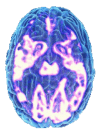
Non-Depressed Brain
Source: Mark George M.D. Biological Psychiatry Branch Division of Intramural Research Programs, NIMH 1993.
More About NeuroStar
Advanced Therapy TMS
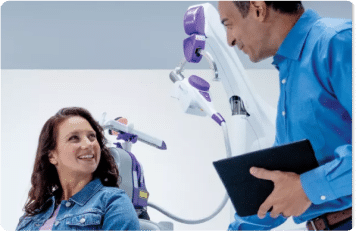
Backed By Proven Research
During a NeuroStar Advanced Therapy treatment session, a magnet similar in strength to that used in a magnetic resonance imaging (MRI) machine is used to stimulate nerve cells in the area of the brain thought to control mood. The result of these magnetic pulses may have a positive effect on the brain’s neurotransmitter levels, making long-term remission achievable.
Trusted By Professionals
Since the FDA clearance of NeuroStar Advanced Therapy TMS in 2008, insurance coverage for eligible patients has increased significantly. Including most Medicare and Tricare plans nationwide. NeuroStar Advanced Therapy TMS is not yet a first line of treatment, it is an alternative option for those who are not responding to or cannot tolerate the side effects of medications.
Free Consultation with Our TMS Director Am I Elegible?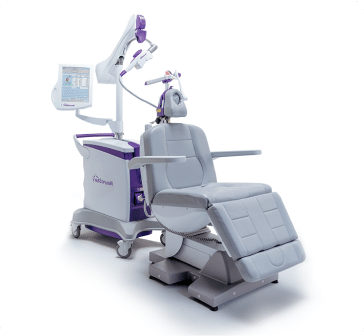
Meet our TMS director
Melissa Gesualdi
Director of Transcranial Magnetic Stimulation (rTMS) Services
NeuroStar TMS Client’s Stories
PRACTICE REPORTED PATIENT OUTCOMES
How Does NeuroStar Work for People with Depression?
The NeuroStar Advanced Therapy System TMS is indicated for the treatment of adults with Major Depressive Disorder (MDD) who failed to achieve satisfactory improvement from previous antidepressant medication treatment in the current episode, and to decrease anxiety symptoms for those who at the same time suffer from anxiety.
The NeuroStar Advanced Therapy system is indicated as an adjunct treatment for adult patients suffering from Obsessive-Compulsive Disorder (OCD).
NeuroStar Advanced Therapy is only available by prescription. A doctor can help decide if
TMS is right for you. Patients’ results may vary.
The most common side effect is pain or discomfort at or near the treatment area.
These events are transient; they occur during the TMS treatment course and do not occur for most patients after the first week of treatment. There is a rare risk of seizure associated with the use of TMS therapy (less than 1 chance in 35,000 per treatment).
NeuroStar Advanced Therapy is only available by prescription.
Visit neurostar.com for full safety and prescribing information.
The NeuroStar Advanced Therapy system is indicated as an adjunct treatment for adult patients suffering from Obsessive-Compulsive Disorder (OCD).
NeuroStar Advanced Therapy is only available by prescription. A doctor can help decide if
TMS is right for you. Patients’ results may vary.
The most common side effect is pain or discomfort at or near the treatment area.
These events are transient; they occur during the TMS treatment course and do not occur for most patients after the first week of treatment. There is a rare risk of seizure associated with the use of TMS therapy (less than 1 chance in 35,000 per treatment).
NeuroStar Advanced Therapy is only available by prescription.
Visit neurostar.com for full safety and prescribing information.

